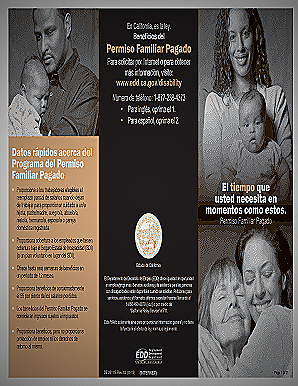Paid Family Leave in Spanish: Everything You Need to Know
In Spanish-speaking countries, paid family leave is a significant benefit for working parents. It allows them to take time off work to care for their newborn or newly adopted child or sick family member without losing their jobs or income.
While the amount of paid family leave varies from country to country, it is an essential support system for Spanish-speaking families, providing financial stability during important times in family life.
Did you know that New York state offers paid family leave in Spanish? Check out this Youtube video and discover how you and your loved ones can benefit from it!
What is Paid Family Leave in Spanish?
El permiso remunerado por paternidad y maternidad en español es un tipo de permiso laboral que permite a los trabajadores en países de habla hispana tomarse un tiempo libre remunerado para cuidar de recién nacidos o adoptados, o para cuidar a familiares enfermos.
En algunos países, como Argentina y España, también se llama “licencia por nacimiento”. La duración y los términos exactos del permiso remunerado por paternidad y maternidad varían en función del país y de la empresa.
Benefits of Paid Family Leave in Spanish
Implementing a paid family leave policy in Spanish-speaking countries can bring about significant advantages for both workers and employers. According to the International Labour Organization, 70% of the world’s population do not have access to adequate paid family leave.
This percentage is even higher in low-income countries, where only 10% of workers have access to paid leave. By providing paid family leave, employees can take time off work to care for their families without worrying about losing their jobs or financial stability.
In countries like Canada, where paid family leave policies are already in place, studies have shown that these policies have helped increase women’s participation in the workforce, decrease the gender wage gap, and improve the health outcomes for mothers and children.
Moreover, offering paid family leave can also benefit employers. A study by the Society for Human Resource Management found that offering paid family leave increases employee loyalty and retention, saves recruitment and training costs, and improves employee morale and productivity.
In Spanish-speaking countries, such as Mexico, where only 12 weeks of maternity leave with reduced pay is guaranteed by law, implementing paid family leave policies can offer significant benefits for both employees and employers. Providing adequate paid family leave can enable workers to take time off to care for their families without facing financial difficulties, as well as improve their overall well-being and job satisfaction.
Moreover, employers can benefit from increased employee loyalty and productivity, as well as decreased absenteeism and recruitment costs.

Challenges of Implementing Paid Family Leave in Spanish
Paid family leave policies are becoming increasingly popular, but there are challenges in implementing them in Spanish-speaking countries. One of the obstacles is the lack of awareness and information about the benefits of paid family leave among employers and employees in Spanish-speaking communities.
This often results in a lack of support and participation in these policies.
Another challenge is the fear of job loss or discrimination that many workers face when taking time off under paid family leave policies. This is especially true for immigrants and workers in low-wage jobs, who may not have the resources to fight back against employer retaliation.
Language barriers are also a major obstacle. Many Spanish-speaking workers may not be proficient in English, which can make it difficult to understand the eligibility requirements and application process for paid family leave benefits.
Lastly, the cost of implementing paid family leave policies can also be a challenge for employers, particularly small businesses. Without government support or incentives, some employers may struggle to provide adequate compensation for employees on extended leave.
How to Access Paid Family Leave in Spanish-Speaking Countries
Paid family leave is a benefit that provides employees with paid time off to bond with a newly born, adopted, or fostered child. Many countries have laws mandating paid family leave, including some Spanish-speaking countries.
Here’s what you need to know about accessing paid family leave in Spanish-speaking countries:
Eligibility for Paid Family Leave
Eligibility for paid family leave in Spanish-speaking countries can vary. In general, employees are eligible for paid family leave if they have worked for their employer for a certain amount of time, usually one year or more.
In some countries, employees may also need to have worked a certain number of hours in order to be eligible.
Application Procedures
The application procedure for paid family leave can also vary by country. In some countries, employees apply for paid family leave through their employer, while in others, they must apply directly to the government.
It’s important to check with your employer or the government agency in charge of paid family leave in your country to determine the application procedure.
Access to Paid Family Leave for Spanish-Speaking Workers
A 2018 report found that Hispanic workers in the United States have lower rates of paid leave access and use than their White non-Hispanic counterparts. It’s important for Spanish-speaking workers to advocate for their rights to paid family leave and to understand their eligibility and application procedures in order to fully utilize this important benefit.
Furthermore, if you’re a Spanish-speaking worker in the United States, paid family leave isn’t guaranteed by federal law, but some states have enacted regulations around paid family leave, such as California and New Jersey. For workers in non-regulated states, some employers may offer paid family leave as a benefit, so it’s important to check with your employer to determine if this benefit is available.
Paid Family Leave vs. Other Leave Policies
Paid family leave is one of several types of leave policies available to Spanish-speaking employees in various countries. Maternity and paternity leave, sick leave, and annual leave are other common types of leave with varying benefits and legal requirements.
In terms of paid family leave in Spanish-speaking countries, the availability and duration of paid leave can differ significantly from country to country. For example, Canada provides 17 weeks of paid leave for new parents, while in Italy, new mothers can take up to 5 months of paid maternity leave.
However, it’s important to note that federal laws in some Spanish-speaking countries do not guarantee paid family leave. Instead, certain states or local governments may have enacted regulations around paid family leave, such as in the United States.
Unfortunately, studies have shown that Hispanic workers have lower rates of paid-leave access and use compared to their White non-Hispanic counterparts, further exacerbating inequalities in the workplace.
It’s also worth noting that annual leave in Spain is relatively generous compared to other countries, with full-time workers entitled to 30 calendar days or 22 working days of paid leave.

Success stories in Implementing Paid Family Leave in Spanish-Speaking Countries
While paid family leave is not guaranteed by federal law in the United States, some states and local governments have enacted regulations mandating that employers provide paid leave to eligible employees. However, Hispanic workers have lower rates of paid-leave access and use than White non-Hispanic counterparts.
In the Czech Republic, eligible employees are entitled to 28 weeks of paid maternity leave. In Italy, new parents are provided with five months’ paid time off to care for newborn or recently adopted children.
These countries have seen positive outcomes, such as increased employee satisfaction and retention rates.
One well-known company with successful paid family leave policies is Patagonia. The outdoor clothing retailer offers 16 weeks of fully paid leave to new mothers and 12 weeks of fully paid leave to new fathers, as well as non-birth partners and adoptive parents.
Since implementing these policies, Patagonia has reported improved employee retention rates and increased levels of employee satisfaction.
Another company that has successfully implemented paid family leave policies is Cisco Systems. The technology company offers up to 12 weeks of paid leave for new parents, adoptive parents, and those caring for sick family members.
By offering paid family leave, Cisco has seen an increase in employee productivity and engagement.
Meanwhile, in Spain, full-time workers are entitled to 30 calendar days, or 22 working days, of paid leave. While there is no nationwide policy for paid family leave, some companies in Spain provide paid leave to their employees.

Conclusion
In conclusion, paid family leave policies are crucial for the well-being of families, especially in Spanish-speaking countries. It is time for companies and governments to prioritize paid family leave policies to support their employees and promote a healthy work-life balance.
Studies have shown that paid leave benefits both employees and employers, and it is essential to create a culture that supports families. We urge everyone to speak out and advocate for permanent and comprehensive paid family leave policies in Spanish-speaking communities to ensure that families have access to the benefits they need.

